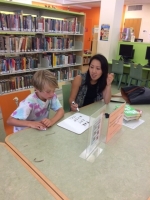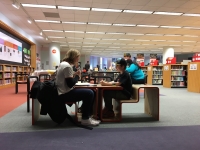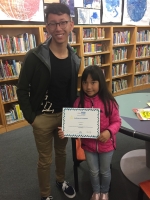FOG Readers: Helping Struggling Readers Succeed
San Francisco Public Library, Calif.
Innovation Synopsis
Parent Myleka says it best: “The FOG Readers Program bridges a clear gap between my child’s current reading level and his full reading potential.” FOG Readers helps elementary students overcome reading difficulties using Orton-Gillingham methodology and multisensory techniques. Students quickly achieve impressive gains in reading skills.
Challenge/Opportunity
Children who fall behind when they start to read rarely catch up on their own. There is nearly a 90 percent chance poor readers in first grade will continue to struggle, affecting every aspect of their education. The problem is caused by deficits in foundational skills – and the solution is the kind of reading intervention and remediation delivered by FOG Readers, the strongest library program of its kind.
Key Elements of Innovation
Structured literacy instruction is effective for all students who are struggling to read, but such programs are cost-prohibitive for many. By leveraging the expertise of San Francisco Public Library’s Learning Differences Librarian, the library is able to offer a free, long-term solution for all families. The FOG Readers program tapped into a deep community need and receives referrals from school social workers and special education teachers, parents groups and other community partners.
Achieved Outcomes
Students who enter the program are an average of 1.3 grade levels behind, but progress more than half a grade level during the first three months of tutoring. All students begin at level one of five and revisit concepts until mastered, ensuring that there are no gaps in critical reading skills. There are more than 100 active tutor-student pairs in SFPL’s FOG Readers, and the library is helping other systems begin their own programs.



